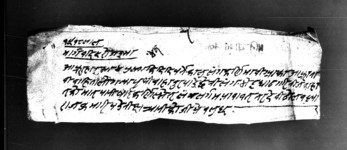A copy of patiyā-pūrjī issued to Rājakumārī Pãḍenī Kṣatryānī (VS 1918)
ID: K_0175_0034
Edited and
translated by Rajan Khatiwoda
in collaboration with
Simon Cubelic
Created: 2015-04-29;
Last modified: 2018-06-19
For the metadata of the document, click here
The accompanying edition, translation/synopsis and/or commentary are available under the terms of the Creative Commons Attribution-ShareAlike 4.0 International License
Abstract
This document—issued very probably by the religious judge (dhamādhikārin) —is a copy of patiyā-purjī certifying that the mandatory expiation has been performed by Rājakumārī Pãḍenī for having had sexual intercourse with her incestuous husband, Pṛthī Bāhādura, and for having shared rice and water with him.Diplomatic edition
[1r]
[...]⟪४१⟫1१९१८साल2मार्गवदि९रोज३मा
3आफ्नाहाड्मा४पुस्ताकिदिदिपर्नेकालुसंगकर्णिमावीग्र्याकाआफ्नाना
4वीवाहितालोगन्यापृथीवाहादुरपाडेछेत्रीसंगभेट्घाटगरीनीजकाहा
5तकोभात्पानिषाईकर्णिस्मेत्संसर्गभय़ावापत्नरदेवीटोलवस्न्या
6राजकुमारिपडेनीक्षत्र्यानीकोजिये़१सुद्ध—२
Translation
[1r]
411
On Tuesday, the 9th of the dark fortnight of Mārga in the [Virama] era year 1918 (1861 CE).
[This is to certify that] 1 body of Rājakumārī Pãḍenī Kṣatryānī, a resident of Naradevī Ṭola, [has been] purified. [She had been polluted] by reason of having met her own ritually married husband, Pṛthī Bāhādura Pā̃ḍe Kṣatrī who is guilty of committing adultery with his 4th-generation female cousin Kālu, of having received rice and water from his hand and even of having engaged in sexual intercourse with him --- 22 .
Commentary
Although the document itself does not reveal who issued it, one can argue on the basis of the customary practices of the time that it must have been some religious judge (see Michaels 2005: 39 and K_0175_0018).
The purjī does not specify whether Rājakumārī has been granted expiation in terms of rice or water. Thus her caste status after the expiation remains unclear.
A careful examination of the facsimile reveals that the back side of the document has the text "patiyāko nakala (copy of patiyā)" written.

